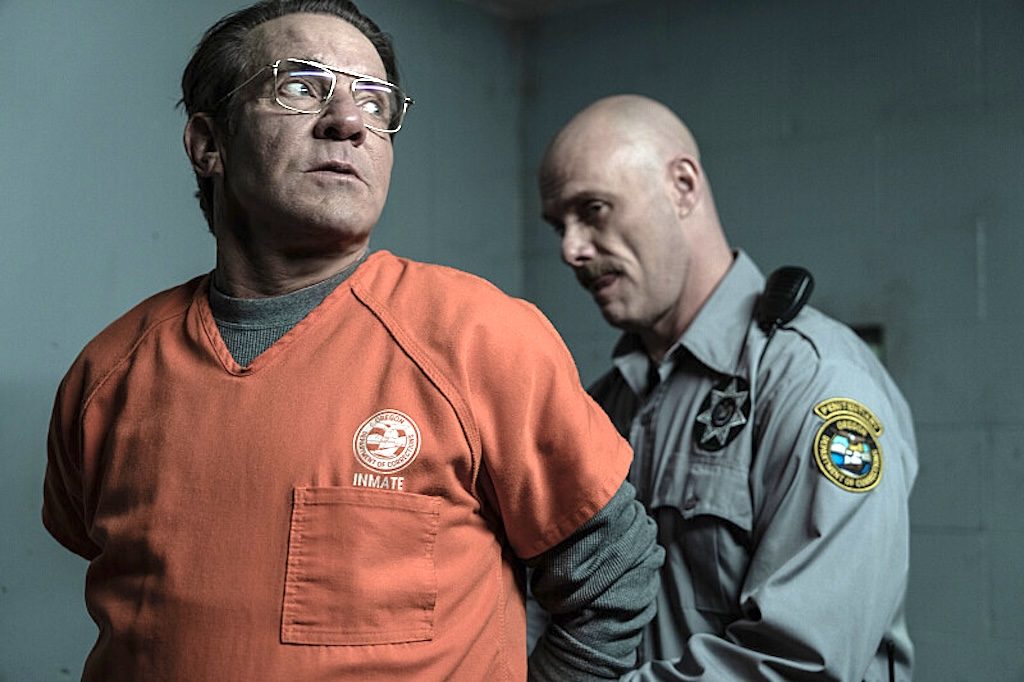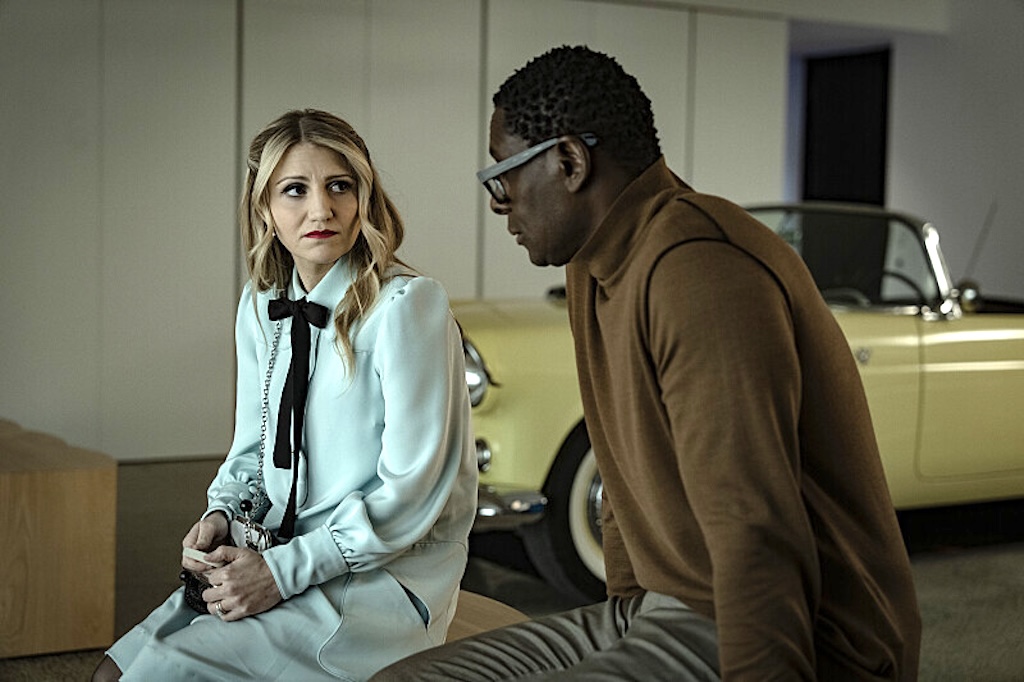It’s a form of trauma not often spoken for. For all our cultural obsession with true crime, we’re often fascinated by the stories of the perpetrators, the victims, and the acts themselves.
But what about the families? While pain, profound loss, anger, and grief obviously mark the journey of a victim’s family, that of a perpetrator’s, instead often embodies guilt, fear and shame. It’s not a connection they usually want anyone to know about and many family members change their names or retreat entirely from social and public life.
Such was the case of Melissa G. Moore, who, at the tender age of fifteen, found out that her father, Keith Hunter Jesperson, is the serial killer dubbed Happy Face. She kept this fact hidden for years, wrestling to reconcile the man she knew as “Dad” with the rapist and murderer who took the lives of at least eight innocent women in the early 1990s (attempting to take credit for up to 152 more).
As she grew older and had a family of her own, Melissa realized her trauma was something she would have to face and process. In 2009, she published a book with co-author M. Bridget Cook, called Shattered Silence: The Untold Story of a Serial Killer’s Daughter, in which she finally tells her story. Almost a decade later in 2018, the iHeart podcast Happy Face aired. Over the course of twelve episodes Melissa, still tormented by questions as to her own identity, delves more into her history and genetics to help answer those tough questions.
Upon listening to the podcast and Melissa’s story, writer Jennifer Cacicio (Your Honor, Shooter) wanted to take things a step further. In a truly creative screenwriting endeavor, she blended fact and fiction to create the eight-episode series Happy Face. Starring Annaleigh Ashford as Melissa and Dennis Quaid as Keith, the series uses Melissa’s real-life story as a starting point to tell a new, fictitious narrative in which Keith claims responsibility for a crime for which another man (“Elijah”, played by Damon Gupton) is currently sitting on death row. Given the real Keith’s penchant for attention, is it a ploy to manipulate his now-adult daughter back into his life?
Cacicio and Moore recently spoke with me about the series and the true stories and personalities underlying the dramatized crime thriller.
Melissa, it’s been a number of years since you first started sharing your story, both through your book (2009) and podcast (2018). What has your journey been like in that time and what brought you to this series?
Melissa: It’s been thirty years now since my father was arrested in 1995. At first, it was so shocking that I changed schools, changed my name… I went into hiding. Years later in 2008, I had a family and I realized I couldn’t run from the past. I knew that at some point I would have to have really tough conversations with my own children. I started to write and come to terms with my own story.

Melissa G. Moore
In 2018. I was still battling with my own identity in relation to my father. Did I have any DNA that would make me like my father in any way? I was also struggling with a sense of guilt in relation to the victims that my father took. Even though I didn’t have any hand in the crimes, I still felt a very deep sense of shame and guilt, wishing I could have done something more. So the podcast really explored questions around my relationship with the surviving family members of my father’s victims and also my identity.
What this series, this medium of fiction, does is it creates autonomy for the people who want to be private while sharing my very personal experience in facing the media, facing my father’s victims and his crimes. It gave me an outlet with the freedom to explore that experience. It also allowed us to have another conversation that was bigger than me, which is about the true crime genre – the reaction of the media to victims. What’s voyeuristic, what’s helpful… the ethics of it, really.
Jennifer, when did you become involved and how familiar were you with Melissa’s story going into this project?
Jennifer: I was introduced to the story by listening to Melissa’s podcast, and wasn’t aware of anything that came before that – I just listened as a fan on my way to work. I was really taken by it and immediately called my agent to ask, “Is someone writing this? Are the rights available? It has to be me”. I think the first time I met Melissa was over Zoom, not in person, and I pitched her. She was meeting a lot of writers at the time and looking for the right one. I was lucky enough that she trusted me with her story.
So we’ve been collaborating since the beginning. She was always available to answer my questions. She gave me her father’s letters and she came to the writers’ room. But once we really got going, she gave me full creative freedom and wanted me to make the show that I wanted to make. Which was amazing, and also a little scary, because she wasn’t involved in seeing every cut – she waited until the end to watch all the episodes. Luckily, she was happy with the result, so it’s a relief!
What additional research did you have to do, if any? What were some of the resources you pulled from?
Jennifer: I read a variety of books, did interviews. The Innocence Project of Texas was involved for the Elijah storyline. Mike Ware is the head of the organization and was our consultant throughout the show.
I also did some interviews with Don Findlay, who is part of the podcast and the son of one of Melissa’s dad’s victims. The character of Ash in the series is inspired by Don and a few other people.
Melissa also shared all of Keith’s letters with me, the cards and things he had sent her over the years. That really helped inform Keith’s character without my needing to contact him, which I did not want to do.
The story you tell in the series is an interesting weaving of fact and fiction, with it being “inspired by” the book and podcast. Can you confirm what is fact, what is fiction and what is dramatized?
Melissa: The flashbacks are true to my experience, as you can tell from the podcast. The story is taken from my own experience and the present-day plot line is more fictionalized.
Jennifer: I was inspired by Melissa’s emotional story – the arc of her overcoming her trauma and her facing her dad and her past to get to a better place is the heart of the show.

Jennifer Cacicio
But when I listened to the podcast, I also knew it wasn’t really enough for a crime thriller. I knew I would need to come up with another plot to drive the narrative that we could use to pin Melissa’s story. From the beginning, when I pitched Melissa, I said, “The way that I see the show is I would add a fictional element. If you want someone who’s going to approach this in a journalistic manner and just dramatize your life, you should definitely go with another writer.” But I think it appealed to her because she had told her story her own way through a few different mediums. She liked the idea that this would be fictionalized and would take on a life of its own.
The other element of it is that it provides people who don’t want to be part of the show with privacy. I really didn’t want to write about her actual children. We changed everything about them – their ages, their interests – to make these fictionalized characters. It allowed us to be free without worrying about whether it would impact Melissa’s children. And with those fictionalized characters, it was an opportunity to dig a little further into other elements of true crime, for example, with Hazel and murderabelia. She’s having a relationship with Keith and his artwork. Obviously, those things didn’t happen, but they’re still within the world of Keith. He really does make artwork and he really does sell it online. He really has tried to contact Melissa’s daughter.
So it was about pulling from the real world and then adding the fictional element to get to the essence of the truth. It was tricky.
What were some of the challenges you encountered in taking that approach?
Jennifer: I think the biggest challenge was at the very beginning, figuring out the right engine that could drive the narrative. It’s a show about the daughter of a serial killer, but to me, it is a bigger show to ask some bigger questions about true crime and media and about why we are so obsessed with it. Is it helping or harming us? I don’t always know the answer to that. I’m a person who listens to all the podcasts and watches and reads everything, but I still question myself about why I do that.
Melissa: A lot of journalists that cover true crime struggle with that as well. They have this internal compass that they’re constantly checking in on. “I’m covering these graphic crimes. How am I telling their story?” It’s a challenge that I know a lot of producers and journalists face, and while there are some bad apples, the majority of people really do care about what they’re putting into the world.
Tell me about framing the narrative with the Dr. Greg Show and how it helps convey that message about the media while also driving the overall story.
Jennifer: I think it’s so interesting. Melissa went from being in hiding to becoming what she is now. She was filled with shame because of these terrible things her dad did and became someone who now empowers other people to tell their stories. Her vulnerability and trauma became a superpower and allowed her to move through the world in a new way and have other people open up to her. It’s just such an amazing character arc.
I knew that she had had experiences of going on talk shows, and now she’s a true crime producer working on a variety of different projects. To tell that story was a no-brainer. It was really appealing to have a show within a show and it allows us to bring the audience into how this stuff is made, behind the scenes, as Melissa is being thrown into the spotlight in the story.

Jennifer Cacicio (Dennis Quaid) & C.O. Bassett (Charles Zuckermann) Photo by Ed Araquel/ Paramount+
Melissa, tell me about your work as a true crime producer and how that fed into this project.
Melissa: When I first came out with my story, I began to get a lot of letters from family members of perpetrators that would say “I’m like you.” I would also get emails from producers saying, “This is a new conversation. We don’t really think about perpetrators having families. Can you tell us about any other families that are like you?”
I started talking to families who were very private and in hiding, asking them if they wanted to tell their stories. Because while I told my story, I’m just one person with my own experience. Each family that I’ve met, whether they’re the victim’s family or the perpetrator’s, brings an element of their experience that I think would be validating to others.
I’m privy to these private conversations that I think other survivors and family members of criminals could really benefit from hearing. It was really up to each of these people that reached out to me if they chose to go public with their story or not. Some just wanted to say, “Thank you, I feel validated” and others said, “You know what, I do want to tell my story.”That’s when I started to match them with the producers. It was very rewarding to see that I was able to be a vessel to help others tell their stories.
How did you want to portray Keith? Tell me about working with Dennis on his character.
Jennifer: I always knew I wanted to cast someone who didn’t often play a villain. I wanted someone who was really likable and charismatic, so that the viewer would have the same conflict that Melissa has: “Why do I like this guy?”
I think, at the beginning, Dennis had hesitations. He didn’t want to glorify Keith and didn’t like the idea that Keith could be going around bragging that Dennis Quaid was playing him. I just assured him that it was Melissa’s story we were telling. We’re not showing any violence, not focusing on Keith’s real crimes, and not flashing back to any of any of that. It’s really about the aftermath and his relationship with his daughter.
Dennis said, “Let me think about it” and I thought it was going to be a “no.” Then he came back the next day and he said “yes”. I asked him what changed his mind and he said, “I realized I’m not actually playing Keith. I’m playing Melissa’s version of Keith.”
I think that really freed him up to not feel pressure to do a direct impression or feel like he had to play it a certain way. He was really just using Melissa’s source material to create this relationship and this dynamic of father and daughter. He was a dream. He was an absolute pro and I think he really understood the assignment. He and Annaleigh [Ashford who plays Melissa] are just amazing together.
Melissa, what was it like to see your story told through Annaleigh’s portrayal of you and Dennis’ portrayal of Keith?
I was nervous about being portrayed and seeing people’s interpretation of who I am as a person. It could go really badly! It depends on how they view you as a person, and you never know what people’s perception of you is. But I thought she was definitely kind in her perception of me, and she understood my guiding light – the essence of why I want to do what I do is to help other people, which also sometimes puts me in the crosshair of criticism. I think she really got my personality, my essence.
Dennis was the same. I think other people could have focused on the physicality of my dad – he’s 6’6”, domineering and physically intimidating. I respect that Dennis decided to go a different route and show the emotional fear factor, which is the manipulation and how clever he is at seducing me back into being vulnerable. I think you see that in the ping pong between Dennis and Annaleigh, and I felt like those conversations were very realistic.

